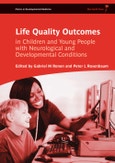Health care professionals need to understand their patients’ views of their condition and its effects on their health and well-being. This book builds on the World Health Organization's concepts of 'health', 'functioning' and 'quality of life' for young people with neurodisabilities: it emphasises the importance of engaging with patients in the identification of both treatment goals and their evaluation. Uniquely, it enables health care professionals to find critically reviewed outcomes-related information. The authors are leaders in their respective research fields and discuss theory, concepts, and evidence, and how these are applied in clinical settings and research applications.
Readership:
- Health care professionals working with children and youth with neurological and developmental conditions, wanting to expand their clinical or research horizons.
- Frontline service providers, health services and social science researchers, clinical program managers and policy makers concerned with ensuring that their clinical or programmatic services are addressing contemporary issues as effectively as possible.
- Students in the health professions and others in related fields (such as social work).
Table of Contents
Chapter 1: Setting the Stage: Introduction and general overview. Gabriel Ronen and Peter Rosenbaum, McMaster University
Section A: Concepts and perspectives of outcomes
(i) Contemporary Concepts in Health, Disability and Life Quality
Chapter 2: Concepts and perspectives on ‘health’ and ‘outcomes’. Gabriel Ronen and Peter Rosenbaum, McMaster University
Chapter 3: ‘Quality of life’ and ‘health-related quality of life’.Rebecca Renwick, University of Toronto
Chapter 4: ‘Health status’ and the usefulness of the ICF framework: clinical and program perspectivesOlaf Kraus de Camargo & Nora Fayed, McMaster University
Chapter 5: The role of ‘participation’ in the lives of children and youth with neurodevelopmental conditions.Dana Anaby McGill University & Mary Law, McMaster University
(ii) Life Issues in Children and Young People with neurodevelopmental conditions.
Chapter 6: A developmental perspective on childhood neurological conditions. Peter Rosenbaum and Gabriel Ronen, McMaster University
Chapter 7: Psychological impact of living with a neurodevelopmental condition. David Dunn & Michelle Thorne Indiana University
Chapter 8: The characteristics of peer relations among children with neurological and developmental conditions. Tracy Vaillancourt,Jennifer Hepditch, Irene Vitoroulis, Amanda Krygsman, Christine Blain-Arcaro, University of Ottawa & Patricia McDougall, St. Thomas More College, University of Saskatchewan
Chapter 9: Romantic relationships and sexual experiences. Diana Wiegerink & Marij Roebroeck Erasmus University Rotterdam
(iii) Contextual Factors in the Lives of Children and Young People with neurodevelopmental conditions.
Chapter 10: Contextual facilitators: Resilience, Coping and Sense of Coherence. Kim Schonert-Reichl University of British Columbia & Veronica Smith University of Alberta
Chapter 11: The family does matter! Lucyna Lach, McGill University
Chapter 12: Stigma: A pervasive contextual barrier. Ann Jacoby, University of Liverpool & Joan Austin Indiana University
Chapter 13: Advancing the rights of children with neurodevelopmental conditions. Sheila Jennings York University, Toronto
Section B: Quality of life outcomes: Methods and measurements
Chapter 14: Measurement concepts, standards and perspectives of patient-reported outcomes. Aileen Davis, University of Toronto
Chapter 15: Practical considerations in choosing Health, Quality of life and health-related quality of life Scales for Children. Nora Fayed, McMaster University
Chapter 16: Complexity in the lives of children and young people with neurological and developmental conditions: The role of qualitative research. Debra Stewart McMaster University
Chapter 17: Understanding self and proxy ratings. Gabriel Ronen & Davis Streiner, McMaster University
Chapter 18: Ethics of patient reported outcome measures. David Streiner, McMaster University
Section C: Opportunities to improve quality life outcomes
(i) Education and Disability
Chapter 19: Knowledge translation: Accessing and using the best evidence to improve child and family outcome. Iona Novak University of Notre Dame Sydney, Australia, Dianne Russell McMaster University, and Marjolijn Ketelaar University Medical Center Utrecht and Rehabilitation Center De Hoogstraat Utrecht, the Netherlands
Chapter 20: Interprofessional Education and Collaboration: Key Approaches for Improving Care. Scott Reeves University of California, San Francisco
Chapter 21: A specialized learning environment can enhance the outcomes of children with cognitive impairment. Elizabeth Kerr Hospital for Sick Children Toronto & Miriam Riches OISE-University of Toronto
(ii) Growing into Adulthood with a Childhood Neurodevelopmental Condition.
Chapter 22: Transition to adulthood: enhancing health and quality of life. Jan Willem Gorter McMaster University, and Marij Roebroeck Erasmus University
Chapter 23: Why we need adult specialists for people with childhood onset neurodevelopmental conditions. Bernard Dan, Free University of Brussels
Chapter 24: Longitudinal approaches to populations with childhood onset neurodevelopmental conditions: Australian experience with Rett syndrome. Jenny Downs &Helen Leonard, University of Western Australia
(iii) Youth, Disability and Society.
Chapter 25: Policies, Programs and Practices: The tensions about life quality outcomes. Gina Glidden, McGill University; & Rachel Birnbaum University of Western Ontario
Chapter 26: What is the emerging role of parent and community organizations in health promotion? Primarily a UK experience. Chris Morris & Val Shilling, Medical School Exeter UK
Section D: Conclusions and future developments
Chapter 27: The ICF and Life Quality Outcomes. Peter Rosenbaum and Gabriel Ronen, McMaster University








